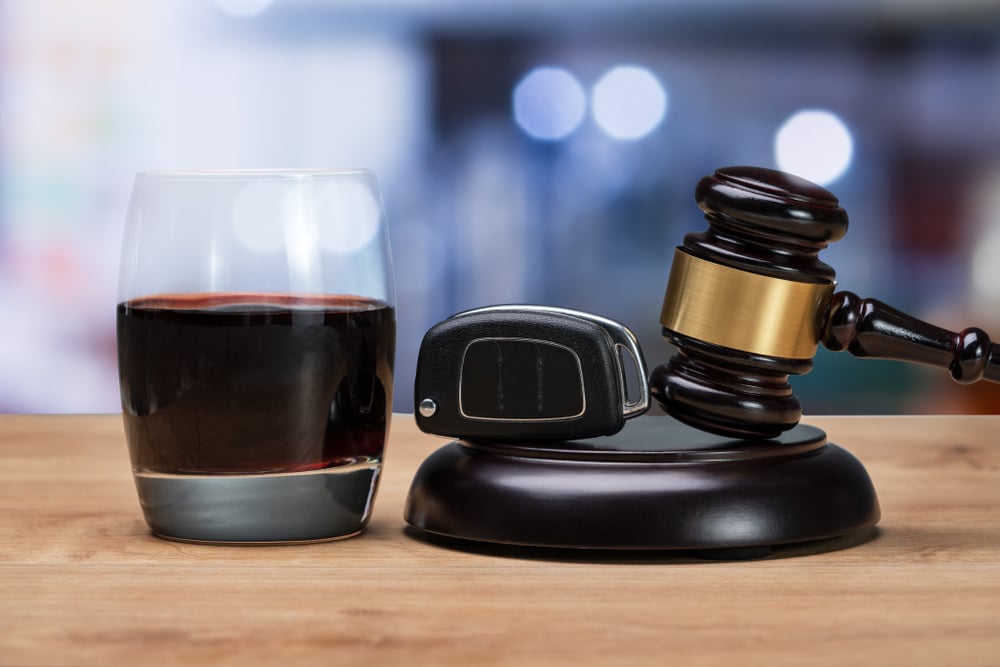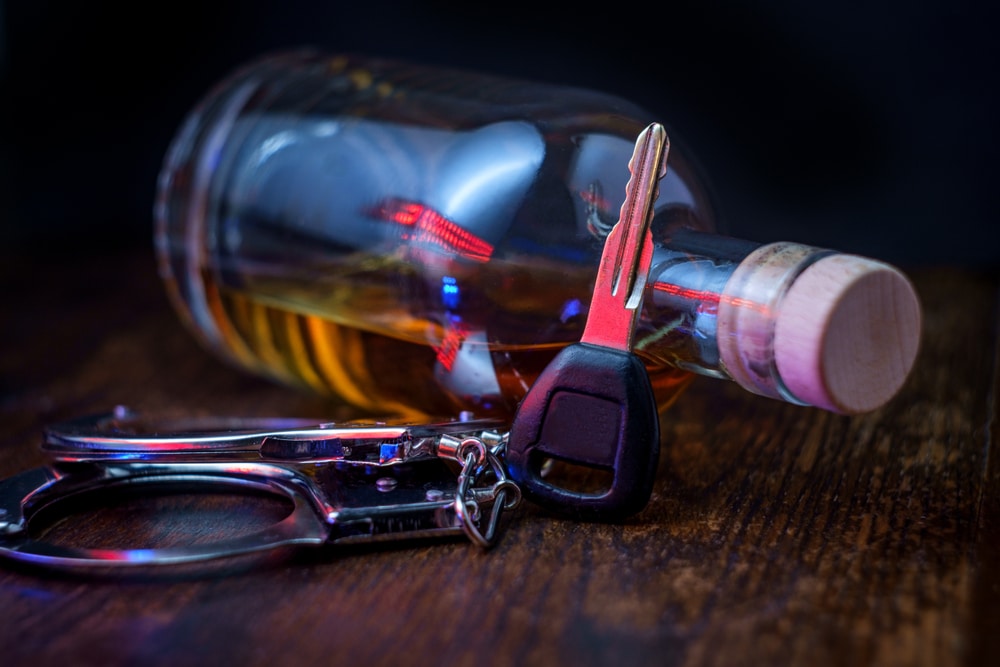
Nebraska enforces strict driving under the influence (DUI) laws through a combination of criminal penalties and administrative sanctions. The state maintains a legal blood alcohol concentration (BAC) limit of 0.08% for regular drivers, 0.04% for commercial drivers, and a “zero tolerance” policy of 0.02% for drivers under 21. Nebraska’s enforcement approach emphasizes both prevention and detection, with particular attention to rural and urban jurisdictions.
The state’s enforcement strategy incorporates coordinated efforts between state and local agencies, with enhanced enforcement during high-risk periods such as holidays and major events. Nebraska’s mix of urban centers and rural areas requires flexible enforcement approaches that address varying population densities and traffic patterns.

0.08% or higher for regular drivers and 0.04% for commercial drivers

Yes

180 days

Conditional

Yes (0.15%+)
Nebraska’s DUI landscape reflects the state’s diverse geography, from metropolitan areas like Omaha and Lincoln to extensive rural regions. The state faces distinct challenges in both urban and rural settings, with particular emphasis on agricultural communities and interstate highway corridors. Seasonal variations in agricultural activity and weather conditions influence enforcement patterns and resource allocation.
The state’s position as a major transportation corridor creates additional challenges, particularly along Interstate 80. Nebraska’s combination of urban centers, rural communities, and tribal lands requires coordinated enforcement efforts and specialized approaches for different jurisdictions.
Nebraska employs a graduated penalty system for DUI offenses that becomes increasingly severe with subsequent violations. First-time offenders face potential jail time of 7 to 60 days, fines ranging from $500 to $1,000, and a six-month license revocation. The state uses a 15-year lookback period for enhancement purposes, making repeat offenses subject to significantly harsher penalties.
Third and subsequent offenses are classified as felonies, carrying mandatory minimum jail sentences and extended license revocation periods. Aggravating factors such as high BAC levels (0.15% or higher), presence of minors in the vehicle, or causing injury/death result in enhanced penalties and mandatory minimum sentences.
Nebraska maintains specific provisions for DUI incidents involving commercial vehicles, boating under the influence, and drug-impaired driving. The state’s regulations extend to both public roadways and private property accessible to the public, with particular attention to agricultural equipment operation given Nebraska’s strong agricultural sector.
Drug-impaired driving cases receive specialized attention through the state’s drug recognition expert program and comprehensive testing protocols. The state addresses cases involving prescription medications through specific guidelines, maintaining that impairment remains illegal regardless of prescription status.
Nebraska law enforcement utilizes a multi-faceted approach including routine patrols, sobriety checkpoints, and targeted enforcement operations. Officers employ standardized field sobriety testing protocols and are increasingly trained in advanced impairment detection techniques. The state maintains specific guidelines for checkpoint operations that balance constitutional requirements with public safety needs.
The enforcement strategy incorporates data-driven approaches to identify high-risk locations and times, particularly around major events and during peak agricultural seasons. Nebraska’s Drug Recognition Expert (DRE) program provides specialized resources for complex cases, particularly those involving drug impairment or mixed substance use.
Nebraska employs modern detection and testing equipment throughout its law enforcement network. Standard equipment includes preliminary breath testing devices for roadside screening and evidentiary breath testing instruments at detention facilities. The state maintains rigorous protocols for equipment maintenance, calibration, and certification to ensure accurate and legally defensible results.
The state has expanded its chemical testing capabilities to address emerging challenges in drug-impaired driving detection. Recent technological implementations include mobile drug testing units and digital evidence collection systems. Nebraska continues to evaluate and adopt new detection technologies while maintaining strict standards for accuracy and reliability.
Nebraska’s rehabilitation approach combines mandatory education with individualized treatment programs. The state maintains a network of approved providers offering services ranging from basic education for first offenders to intensive treatment for repeat offenders. Programs are designed to serve both urban and rural populations with consideration for accessibility and effectiveness.
Treatment providers must meet state certification requirements and follow standardized protocols while maintaining flexibility to address individual needs. The state has expanded program accessibility through regional facilities and, where appropriate, telehealth options to serve rural communities.
All DUI offenders in Nebraska must complete a substance abuse evaluation and follow recommended treatment programs. The required level of treatment is determined by assessment results and offense severity, ranging from brief intervention programs for first-time offenders to intensive outpatient or residential treatment for repeat offenders.
Completion of prescribed treatment programs is mandatory for license reinstatement, with specific requirements monitored through probation services and treatment providers. The state maintains strict compliance requirements while providing reasonable accommodation for work and family obligations.


Nebraska implements a comprehensive monitoring system that includes regular probation meetings, random testing, and electronic monitoring when required. The state utilizes a combination of in-person and remote monitoring technologies to ensure compliance with court-ordered requirements and treatment programs. Particular attention is given to high-risk offenders and those with multiple violations.
Compliance violations trigger a structured response system that considers both the severity of the violation and the offender’s overall progress. The state maintains an integrated reporting system connecting courts, treatment providers, and probation officers to ensure timely communication and appropriate responses to violations.
Nebraska operates parallel administrative and criminal processes for DUI offenses. The Department of Motor Vehicles handles administrative license revocations independently of criminal proceedings, allowing for immediate administrative consequences while criminal cases proceed. The process includes specific timelines for administrative hearings and appeals.
Administrative actions typically begin within 10 days of arrest, with provisions for temporary driving permits during the administrative review period. The state maintains electronic systems for tracking administrative actions and communicating with law enforcement and courts statewide.
Nebraska’s administrative procedures include specific timelines for license actions and appeals, with clear requirements for documentation and hearing requests. Offenders have 10 days from notice to request administrative hearings challenging license revocations, with specific procedures for conducting hearings and presenting evidence.
The administrative process incorporates electronic record-keeping systems accessible to relevant agencies statewide. These systems facilitate efficient processing of administrative actions while maintaining accurate records of compliance and violations. The state ensures due process through standardized procedures and notification requirements.
Nebraska’s court system processes DUI cases through a structured sequence that emphasizes both accountability and rehabilitation. Many jurisdictions operate specialized DUI courts, particularly in larger population centers, focusing on intensive supervision and treatment for repeat offenders. The state’s court system maintains uniform procedures while allowing for local variations based on community needs.
Courts increasingly utilize digital case management systems and virtual hearing options when appropriate, particularly for routine proceedings. The state emphasizes efficient case processing while protecting defendants’ rights and ensuring access to necessary services and programs.
Primary responsibility for DUI enforcement and management in Nebraska is distributed among several key agencies. The Department of Motor Vehicles manages licensing and administrative penalties, while the Nebraska State Patrol leads enforcement on state highways. The Department of Health and Human Services oversees treatment provider certification and program standards.
Local law enforcement agencies, county prosecutors, and courts play vital roles in enforcement and prosecution. The Nebraska Crime Laboratory manages chemical testing and analysis. Inter-agency coordination is facilitated through shared information systems and regular communication protocols.
Nebraska participates in the Interstate Driver License Compact, sharing DUI conviction information with other states and recognizing out-of-state convictions for enhancement purposes. The state’s position as a major interstate transportation corridor requires specific attention to commercial vehicle operators and out-of-state drivers.
Cross-border enforcement coordination is particularly important given Nebraska’s central location and major interstate highways. The state maintains agreements with neighboring jurisdictions for enforcement cooperation and information sharing.
Nebraska’s DUI laws apply statewide but face unique challenges in areas with overlapping jurisdictions, particularly regarding tribal lands and federal properties. The state maintains agreements with federal and tribal authorities addressing enforcement while respecting sovereign authorities.
Special considerations apply to agricultural operations and private property accessible to the public. The state’s enforcement approach recognizes these jurisdictional complexities while maintaining consistent standards for public safety.
The financial impact of a DUI conviction in Nebraska typically ranges from $5,000 to $20,000 for a first offense. These costs include court fines, legal fees, increased insurance premiums, mandatory program costs, and potential lost wages. Repeat offenses generate substantially higher costs due to increased penalties and program requirements.
The state allocates significant resources to DUI enforcement and prevention, including specialized equipment, officer training, and public education programs. While fines and fees contribute to offsetting these costs, the primary focus remains on public safety and prevention rather than revenue generation.


DUI incidents in Nebraska generate substantial societal costs through medical expenses, property damage, lost productivity, and fatalities. Annual economic impacts from DUI-related incidents are estimated to exceed $200 million statewide. Emergency response costs, particularly in rural areas, contribute significantly to these totals.
The state’s agricultural economy faces additional impacts from DUI-related incidents, particularly during critical farming seasons. Studies indicate that preventing a single serious DUI incident saves approximately $50,000 in combined social costs, with higher figures in cases involving injuries or fatalities.
Nebraska’s legislature regularly evaluates and updates DUI laws to address emerging challenges and incorporate new technologies. Recent legislative focus includes strengthening penalties for high-BAC offenses, expanding treatment accessibility, and enhancing consequences for drug-impaired driving. Current proposals under consideration include expanded use of ignition interlock devices and enhanced monitoring technologies.
The state demonstrates increasing interest in evidence-based approaches that balance enforcement with rehabilitation. Legislative trends indicate growing support for technology-driven solutions and comprehensive treatment programs, while maintaining strong deterrent measures.
Nebraska continues modernizing its DUI enforcement system through technology adoption. Recent implementations include advanced breath testing equipment, digital evidence management systems, and improved data sharing capabilities between agencies. The state evaluates emerging technologies for both detection and monitoring purposes.
Integration efforts focus on creating seamless communication between law enforcement, courts, and treatment providers. Mobile applications and digital platforms increasingly support enforcement and compliance monitoring while maintaining data security and reliability.
Current challenges include addressing the rise in drug-impaired driving, particularly involving prescription medications and marijuana. Nebraska is developing new protocols and training programs to address these emerging threats while maintaining effective enforcement practices.
The increasing complexity of chemical testing for newer substances presents ongoing challenges. The state continues to adapt its approaches through enhanced officer training, specialized detection programs, and updated testing protocols.
Nebraska maintains comprehensive prevention strategies targeting various age groups and demographics. School-based initiatives reach students before driving age, while public awareness campaigns address adult populations through multiple channels. The state’s prevention efforts emphasize both urban and rural communities, with particular attention to high-risk populations.
Programs incorporate local community involvement and partnerships with educational institutions, businesses, and healthcare providers. The state has expanded its digital outreach efforts while maintaining traditional communication channels important for reaching diverse populations.
DUI convictions in Nebraska can significantly impact employment opportunities, particularly in industries requiring driving or operating machinery. Commercial drivers face severe consequences under federal regulations, often requiring career changes. The state’s agricultural and transportation sectors maintain strict policies regarding DUI convictions, affecting employment prospects in these key industries.
Professional license holders face additional scrutiny through their licensing boards, with potential impacts on career advancement and job retention. While Nebraska law provides some protections against discrimination, employers can consider DUI convictions in hiring decisions, especially for positions involving transportation or safety-sensitive duties.
Nebraska’s treatment programs show varying success rates, with completion rates averaging 70% for court-ordered programs. Success metrics indicate reduced recidivism rates among program graduates, particularly in programs incorporating both education and counseling components. The state continuously evaluates program effectiveness through data collection and outcome analysis.
Program effectiveness varies based on factors including program intensity, individual compliance, and available support systems. Recent data shows particularly strong outcomes for programs incorporating both treatment and monitoring components, with specialized success in programs addressing specific population needs.
DUI convictions in Nebraska typically result in substantial insurance premium increases, often doubling or tripling rates for three to five years. Insurance companies classify DUI offenders as high-risk drivers, requiring SR-22 filings and maximum coverage levels, with some carriers declining coverage altogether.
The state maintains strict oversight of insurance requirements for DUI offenders while monitoring compliance through automated systems. Recent insurance regulation changes have strengthened monitoring requirements while addressing coverage accessibility issues.


Nebraska mandates SR-22 certification for drivers convicted of DUI, typically extending for three years from license reinstatement. The requirement includes immediate notification to the state if coverage lapses, triggering automatic license suspension until coverage is restored.
The financial burden of SR-22 requirements includes both higher premium rates and filing fees. Nebraska’s system includes provisions for monitoring compliance while maintaining consistent enforcement standards across the state.
DUI convictions in Nebraska often create lasting impacts on daily life, particularly regarding transportation and employment. Many offenders face significant challenges maintaining employment and meeting court obligations while dealing with license restrictions. The impact on quality of life extends to family relationships, financial stability, and future opportunities.
Recovery and rehabilitation efforts often require substantial lifestyle adjustments and support systems. The state’s focus on comprehensive rehabilitation includes addressing these quality of life impacts through support services and resource referrals, while maintaining emphasis on public safety and prevention.
Nebraska’s DUI enforcement system represents a balanced approach combining strict enforcement with rehabilitation opportunities. The state maintains a comprehensive framework of criminal and administrative penalties while providing pathways for recovery and reintegration. This structure reflects Nebraska’s commitment to public safety while acknowledging the importance of effective rehabilitation programs and the unique challenges faced by both urban and rural communities.
The enforcement landscape incorporates modern technologies and evidence-based practices throughout the detection, prosecution, and rehabilitation process. From initial traffic stops through compliance monitoring, the state employs practical approaches suitable for its diverse population centers and agricultural regions. Law enforcement agencies utilize advanced detection equipment and standardized protocols, while administrative processes increasingly leverage digital platforms for efficiency and accuracy. This technological integration helps maintain consistent enforcement while improving communication between agencies and stakeholders.
Financial implications of DUI convictions are substantial, with costs typically ranging from $5,000 to $20,000 for first offenses. These expenses encompass direct penalties, legal fees, insurance increases, and mandatory program costs. The broader societal impact extends beyond individual costs, affecting public safety, healthcare systems, and economic productivity. Nebraska’s position as a major transportation corridor and agricultural state adds particular complexity to both enforcement and economic considerations.
Treatment and rehabilitation programs reflect Nebraska’s commitment to reducing recidivism while maintaining public safety. The state’s network of providers offers services ranging from basic education to intensive treatment, with programs adapted to serve both urban and rural populations. Program effectiveness data shows promising results, particularly where comprehensive services are accessible and monitored appropriately. The state continues to expand program accessibility while maintaining quality standards and compliance requirements.
Looking forward, Nebraska continues to adapt its approach to address emerging challenges while maintaining effective enforcement. Legislative trends indicate movement toward technology-based solutions and enhanced monitoring capabilities, particularly regarding drug-impaired driving and repeat offenders. The state’s commitment to both enforcement and rehabilitation remains strong, with ongoing efforts to improve program effectiveness and accessibility across its diverse communities. These efforts reflect Nebraska’s dedication to reducing impaired driving while providing realistic pathways for rehabilitation and recovery.
At DUI 101, our mission is to empower you with the knowledge needed to make informed decisions during this challenging time. Explore our articles and guides to better understand your situation and the steps ahead.
© 2024 Chapman SEO LLC. This website is for educational and informational purposes only. All content is created using AI technology and maintained by non-lawyers and should not be considered legal advice. The information provided is general in nature and may not be suitable for your specific situation. Always consult with a qualified legal professional for advice regarding your individual circumstances. We do not create attorney-client relationships through this website. By using this site, you acknowledge that you have read and understand these terms.